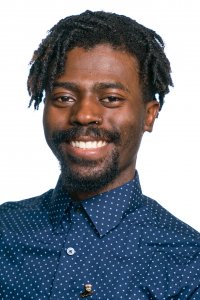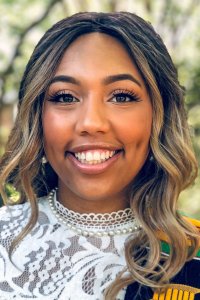Juneteenth
Ohio Wesleyan Young Black Alumni Share Their Perspective on Juneteenth

Juneteenth (June 19) – the date in 1865 that effectively marked the end of slavery in the United States, when Union troops arrived in Galveston, Texas, announcing both the end of the Civil War and President Abraham Lincoln’s Emancipation Proclamation. Today, Juneteenth is recognized by 47 U.S. states and the District of Columbia and is widely recognized as the nation’s longest-running African American holiday.
Q: What is the significance of Juneteenth for you? How is this Juneteenth different for you than those in the past?
Harper - “If we want to talk about significance, we need to talk historically as well as personally/individually. Historically, Juneteenth holds tremendous significance, commemorating the fall of the last hold-out confederate state in the South and the releasing of the last enslaved people in this country. It came late, but it came nonetheless. Personally, I don’t have a strong relationship to Juneteenth. I was taught what the day was, and how it compared to July 4th: a nationally recognized ‘independence’ day, that often never mentions whose independence is truly being celebrated. Fourth of July, in my opinion, is the whitest holiday in the country because it symbolizes American pride, and American pride has shown us time and time again that it does not include Black people. To circle back to significance, we have an issue as a society where we believe everything of significance should be celebrated, and in result we determine one's significance by how passionately we celebrate, and I don’t always agree. I believe we should remember, learn from, and teach everything of significance, and then a select few should be celebrated. Juneteenth should be celebrated, but if we are saying that the only way for it have significance in our country is for it to be deemed a national holiday, I have a problem with that because personally Juneteenth does nothing for me unless it is partnered with a commitment to learning from the past and taking action against the current disparities facing Black people in America.”

Davis – “It’s a day that celebrates emancipation. While I have definitely been aware of Juneteenth since I was a kid, it hasn't been something my family consistently celebrated year after year. I think this year, more than ever, it is a reminder that there is still so much work to be done. It’s not enough to say we live in the ‘Land of the Free.’ Those words will remain hollow until freedom is granted to everyone.”
Q: What has the past month been like for you?
Harper - “The past month has been absurd. At first, I oddly felt like I was missing something, like I didn’t get the memo, but then I realized that there was an ‘awakening’ happening in the very people that were late to the party. A collective lightbulb has gone off in a majority of people's heads and for the first-time white people are recognizing that Black bodies are endangered, that the Black experience has been invalidated, and that Black lives do indeed matter. And what really gets me is that nothing being said or demanded is new. It has all been said and done before, and yet white people are playing amnesiacs as if they have no idea how it got this bad. But again, unless you live this Black experience daily, it's often indescribable. Since George Floyd's death, I will randomly get texts or calls from white friends, colleagues, mentors, ensuring me that my life, to them, does matter. And I know wholeheartedly that these come with the best intentions in mind, but I also am highly aware of how numb it makes me feel. I struggle daily to formulate into words the numbness I've felt this past month since the death of George Floyd.”
Davis – “It has definitely been a whirlwind of emotions. I’ve found myself fortunate that I have surrounded myself with people who understand the urgency of the BLM movement and aren’t shying away from conversations.”
Q: How would you like things to change moving forward?
Harper - “I want the persecution of Black bodies to stop. That's the change I want. Moving forward I'd like action to be taken. I'd like to see words and action become one because too often one thing is said, and another thing is done, and I am tired of it. I want Black people in the ‘room’ and for their voices to be taken seriously.”
Davis – “I recognize that the systems in place are too far gone for there to be an immediate fix. We need police reforms, healthcare reforms, education reforms, prison reforms, etc. What I don’t want to see is a loss of urgency for change and for justice. Even this month, Black lives are still being lost at an alarming rate. The movement doesn’t end with these protests; it starts here, and it ends with change.”
Q: If someone is struggling with understanding the Black Lives Matter movement, what do you think are the best resources for them?
Harper - “If someone is having issues understanding the Black Lives Matter movement, no amount of resources will change their mind. What's really happening when they claim to not "understand" is them politely saying ‘I don’t believe you.’ There are resources far and wide, and have been for years, in many forms such as books, articles, podcasts, etc. But at the foundation, what is required is listening to Black voices and believing them.”
Davis – “Educating yourself on the issue and having an honest conversation with yourself about what your biases and reservations are. Books on antiracism and understanding privilege are flying off shelves, but there’s no better time to do some reading than when you’re at home hiding from COVID-19. I also would say do not be afraid to ask questions. While one person can’t speak for the experience of everyone, talking to someone you’re comfortable with about their experience makes the issues more personal and could help you better understand the fight. And to those who have been asked a million questions ... take a deep breath and answer another one. It’s exhausting to feel like you’re responsible for educating people especially when there are resources that can help but being dismissive of someone’s attempt to understand could backfire and destroy the progress we are trying to make.”
Q: What four words would you use to describe living in America as a Black person before the death of George Floyd?
Harper - “For me living as a Black person in America are these 4 words: Exhausting, Enigmatic, Numbing, and Black. Black encompasses the full complexity of the experience from the joys, pains, struggles, absurdities, and more.”
Davis – “Optimistic but still uncertain.”
Q: What four words would you use to describe how you've felt since George Floyd's death?
Harper – “I'd say not much about my experience being Black has changed since Floyd's death, but I am aware of other people's newfound awareness that my experience being Black is not sunshine and rainbows.”
Davis – “Tired, but not done.”
